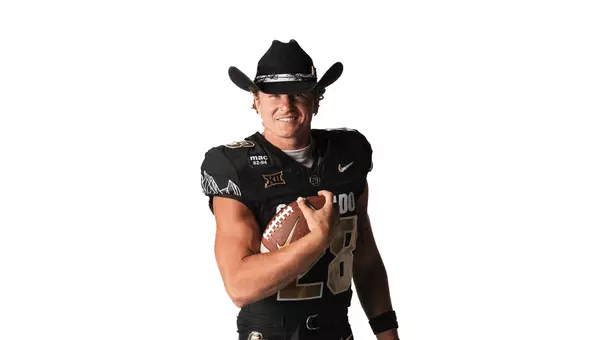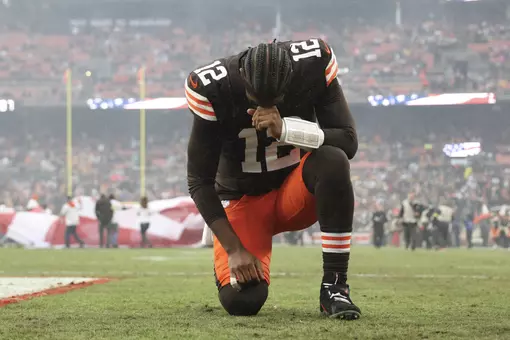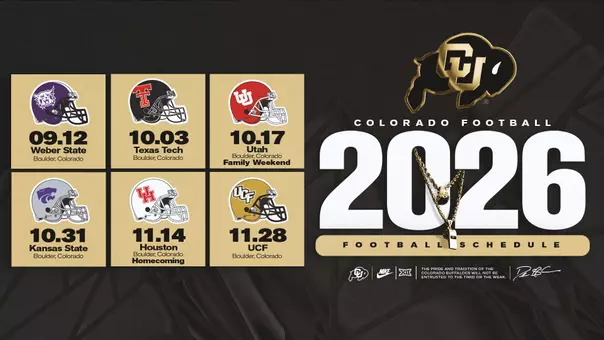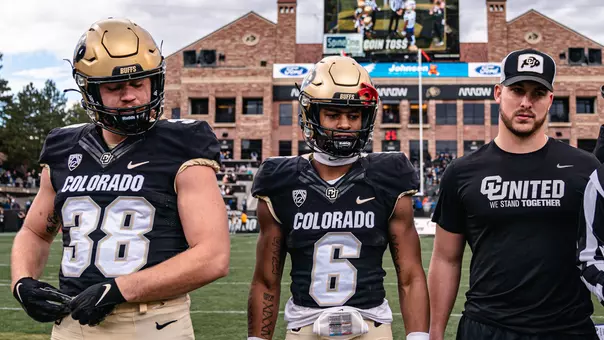Colorado University Athletics
25 Years Later, 'Miracle In Michigan' Still Required Buffs Lore
September 24, 2019 | Football, Neill Woelk
"Stewart, with time. Lets it go … he's got three people down there … the ball's up in the air … caught! Touchdown! Caught by Westbrook for a touchdown! Incredible!"
Legendary ABC announcer Keith Jackson, calling the final play of the 1994 Colorado-Michigan game
BOULDER — It has become required knowledge for every Colorado football fan, a truly iconic moment in Buffaloes history that is now being passed down from generation to generation.
Known alternately as "The Miracle In Michigan" and more simply, "The Catch," it is one play forever burnished in CU's memory banks.
Kordell Stewart to Michael Westbrook for a 64-yard touchdown as time expired and a 27-26 Colorado victory at the Big House in Michigan on Sept. 24, 1994.
Even 25 years later, it is one of those rare moments that does not fade with time but rather gains luster as the years go by.
Everyone who knows Colorado football knows the basic elements of the moment. Backed up on their own 36-yard line with six seconds to play and trailing 26-21, the Buffs had time for one more play. Stewart dropped back in the pocket and launched a pass that traveled 72 yards in the air. Tipped at the 1-yard line, the ball bounced into the end zone, where a diving Westbrook came up with the catch, silencing a crowd of 100,000-plus.
As mayhem unfolded on the field, Colorado didn't have to kick the extra point. Time had expired and Bill McCartney's Buffs were happy to head to the locker room with a one-point victory. The moment became an instant classic, one still universally recognized as one of the greatest plays in college football history.
Legends instantly began to sprout.
Former Buffs wide receiver Blake Anderson, generally credited with keeping the ball alive at the goal line, forever became known as "Tipper" to friends and fans. Stewart became a nationally known name, as did Westbrook, and both found themselves thrust into the Heisman Trophy conversation. (Ironically, a player who threw a key block on the play, running back Rashaan Salaam, would one week later have a huge game at Texas that put his name in the discussion. He soon surpassed his teammates in name recognition and would go on to become CU's first Heisman winner later that year.)
But while every CU fan knows the basics, stories behind the story have unfolded over the years, enriching the legend of the moment. At the same time, key elements that led up to the play — moments that made the play possible — have faded.
So today, we take a look at some of the backstories and remember those preceding situations, all of which set the stage for the perfect ending:
— Many thought Colorado's last chance at a comeback had been snuffed with just more than five minutes to play when Stewart fumbled into the end zone and Michigan recovered, giving the Wolverines possession with 5:08 on the clock and a 26-14 lead.
But CU's defense then produced two huge three-and-out stops. The first came thanks to big plays by linebacker Ted Johnson and defensive linemen Kerry Hicks and Shannon Clavelle. The Buffs used two of their timeouts on that possession and took over with 3:52 remaining.
Colorado then needed just 1:36 to score. Stewart completed four passes on the drive and ran for 21 yards before Salaam scored from 1 yard out to pull Colorado within five, 26-21, with 2:16 still to play.
— Then came CU's biggest defensive stand of the game, along with a brilliant timeout call.
After two Michigan running plays netted just three yards, Colorado opted to call timeout before the third-down play. It was a gutsy move, as conventional wisdom would have suggested that CU wait until fourth down to call time out.
But, as former CU assistant and later head coach Rick Neuheisel pointed out in an interview last week, with the clock stopped, Michigan would not dare try to pass the ball, even on third-and-7, for fear of stopping the clock again with an incompletion. The Buffs knew Michigan would run.
"Coach McCartney wasn't convinced at first," Neuheisel said. "After we called the timeout, he just gave me that stare and said, 'It better work.'"
It worked. The Wolverines did indeed run and Johnson stopped the attempt 3 yards short of the first-down marker. Michigan then even helped the Colorado cause more, calling its own timeout before the punt with 21 seconds remaining.
That gave CU the ball on its own 15-yard line with the stadium clock showing 14 seconds left to play.
— At that point, it's almost as if the ABC television crew of Keith Jackson and Bob Griese had a script of what was about to unfold.
"They have to try to get it to to Westbrook or (Rae) Carruth about 15, 20 yards coming across the field and let them run with it," Griese said.
Bingo. Stewart connected with Westbrook across the middle and he picked up 21 yards before being tackled with 8 seconds remaining. The Buffs then ran to the line of scrimmage as the chains were moved, and a Stewart spike on the next play used just two seconds, leaving CU with six ticks on the clock.
Then came Jackson's assessment of what everyone knew would be the last play of the game:
"So, who've we got here?" Jackson asked. "We've got Carruth, who can fly. You've got Westbrook, a leaper and big and strong and can run. I would think James Kidd would be on the field as well. Probably Blake Anderson. He's a tough guy."
Bingo again. All four were on the field, with three receivers to the left — the play was called "Rocket Left" — and one to the right.
"If I were the defense, I'd have a few more guys over there," Griese warned the national audience.
— Actually, Michigan had already defended the Hail Mary once in the game. Just prior to the end of the first half, the Buffs tried a heave to the end zone, only to have it intercepted by Michigan's Chuck Winters.
That led to some halftime adjustments.
"You know how everyone talks about halftime adjustments? We're probably the only team in history to make adjustments to their Hail Mary at halftime," Neuheisel laughed. "We tweaked some things. Instead of Michael tipping it, we wanted him behind so he could go up and get it."
— The Buffs did indeed get another chance, this time with the game on the line. Michigan's Trevor Pryce nearly got past CU lineman Tony Berti, but Salaam was there to help and he kept Pryce at bay long enough to buy Stewart time to make the throw. The ball floated seemingly forever through the Michigan sky before chaos hit at the goal line.
"All you see are the stripes on the ball starting to slow," Westbrook told ESPN on the 20-year anniversary of the play. "It felt like I was running forever, and I'm cramping up. ... I'm about to jump as hard as high as I can jump, but I can't because (Michigan DB) Ty Law wraps his arms around my legs, so I don't get as high. I'm about to probably overshoot the ball, but someone's underneath. So many things had to happen for that play to work."
But all those things did happen — and while 100,000 Michigan fans sat silent in jaw-dropping shock, Colorado players and a sliver of CU faithful in the stands celebrated wildly.
"No flags anywhere!" screamed CU play-by-play man Larry Zimmer. "Touchdown Colorado!"
— For McCartney, it was a triumphant return to the state where he cut his coaching teeth and the stadium where he learned under legendary Michigan head coach Bo Schembechler. "To leave there and come back there and win like that is just way beyond anything you can orchestrate or prescribe," McCartney told USA Today earlier this year.
— One of the "stories behind the story" that has only recently come to light is Neuheisel's insistence that Westbrook almost didn't make the trip.
According to Neuheisel, on the Thursday before the game, Westbrook missed a required session in the training room. Anyone who knew Bill McCartney knew that such a transgression would likely mean he would leave Westbrook at home — even though Westbrook was a Detroit native and was heading home to play in front of friends and family.
"We're in the meeting room, waiting for our 6:30 meeting and (head trainer) Dave Burton walks in, looks at me and says, 'Westbrook's a no-show,'" Neuheisel said last week. "One of the miracles of that week is that Mac (McCartney) is late to his own meeting. That never happened. But he hasn't opened the door yet and I tell Dave not to say anything. I'll be right back."
Neuheisel then ran to his car and drove to Westbrook's apartment, just a few minutes from campus.
"I bang on the door and he answers in nothing but his shorts," Neuheisel said. "He says, 'I'm sorry,' but I just say we'll worry about sorry later. I tell him he doesn't need clothes, just get in the car and go."
The two then returned to the Dal Ward Center, where Westbrook went to the training room and Neuheisel went back to the meeting — where he knew he would be greeted by the wrath of McCartney, who abhorred anyone being late to a meeting.
"He asks me why I'm late and I tell him I was actually there at the beginning, but had an upset stomach," Neuheisel said. "I wink at Burton and the meeting goes on."
To be fair, Neuheisel said, his story to McCartney wasn't a complete lie.
"The thought of playing Michigan without Michael Westbrook kind of made me sick to my stomach," he laughed. "Plus, there's no way a kid from Michigan could miss that game."
Westbrook denies the story, telling the Denver Post last week, ""Let him have fun with his 25-year story. Because I seriously doubt that. I had 70 people in (Michigan) Stadium that I had gotten tickets for. I literally had 70 tickets for that game, and I'm going to miss that one? I was lazy my freshman year. My senior year, I was making it happen."
Neuheisel, though, insists the "miracle before the miracle" occurred.
— As the years went by, the moment only grew in magnitude. Players from both sides still have joyous — or painful — memories that have not faded a bit.
Salaam, who went on to win the Heisman Trophy that year and become a first-round NFL Draft pick, told ESPN that it was a pinnacle moment of his career. It was one of the last in-depth interviews Salaam conducted before his death in December 2016.
"That was the biggest moment of my football career," he said. "It was even bigger than going over 2,000 yards. Bigger than winning the Heisman. Just being down and staying together and Kordell being a leader. ... I just knew when that happened — in front of the Big House, in front of one of the biggest crowds in college football — I knew it was going to be something special. On YouTube, I go back to that play every couple days. It was amazing, man. It was special. It's one of those plays I was part of."
— Now, a quarter-century later, the play is required lore for every Colorado Buffs fan. A generation of CU followers who weren't even alive then have learned the moment as if it is the gospel. They can recite the time, the circumstances and the result.
"All those involved will never forget it," ABC's Jackson said to end his broadast. "Either for the joy of it or the pain of it."





